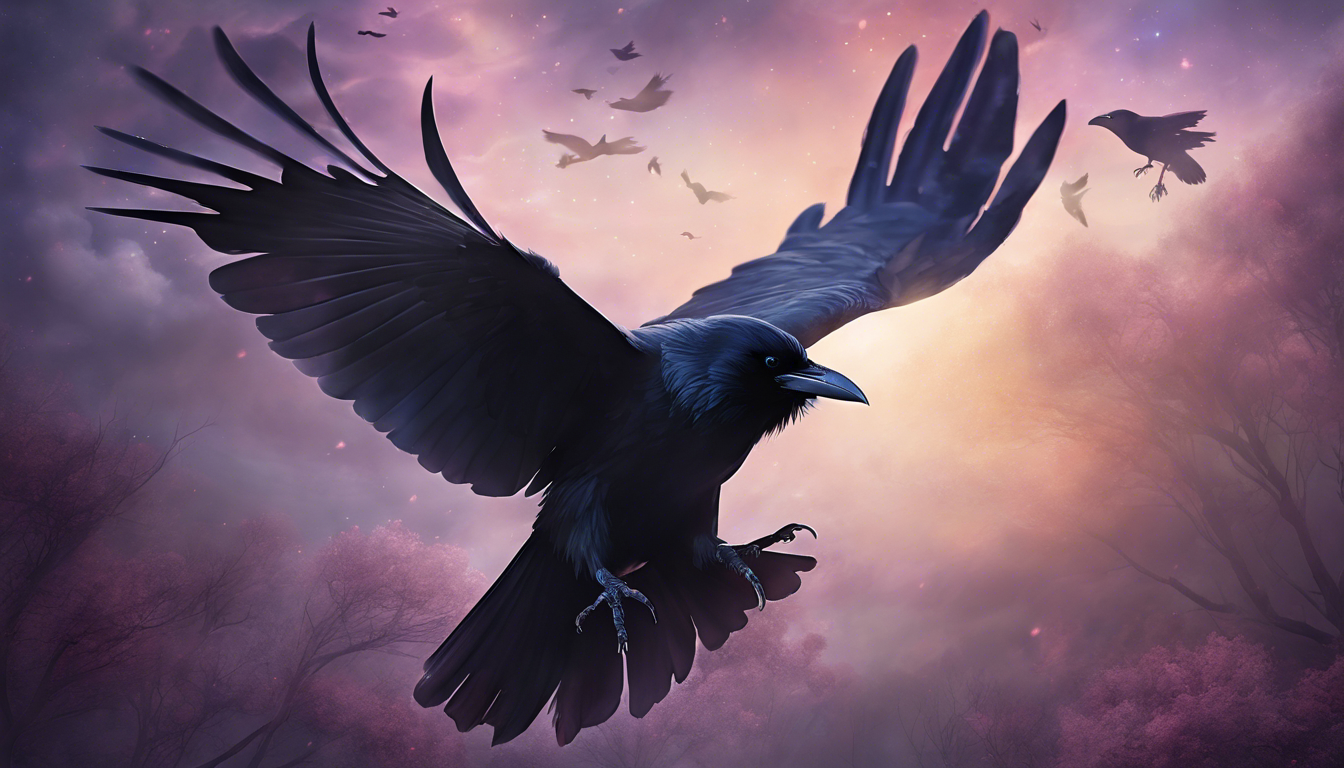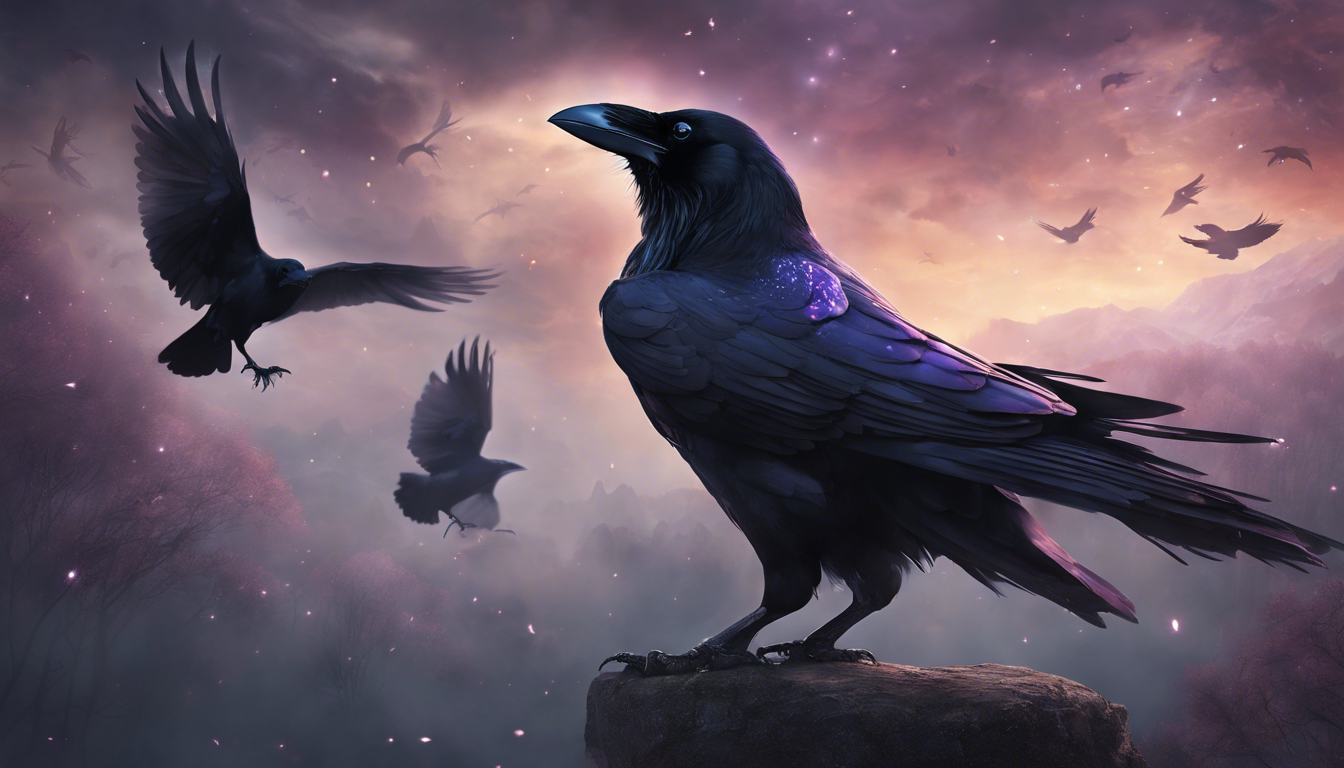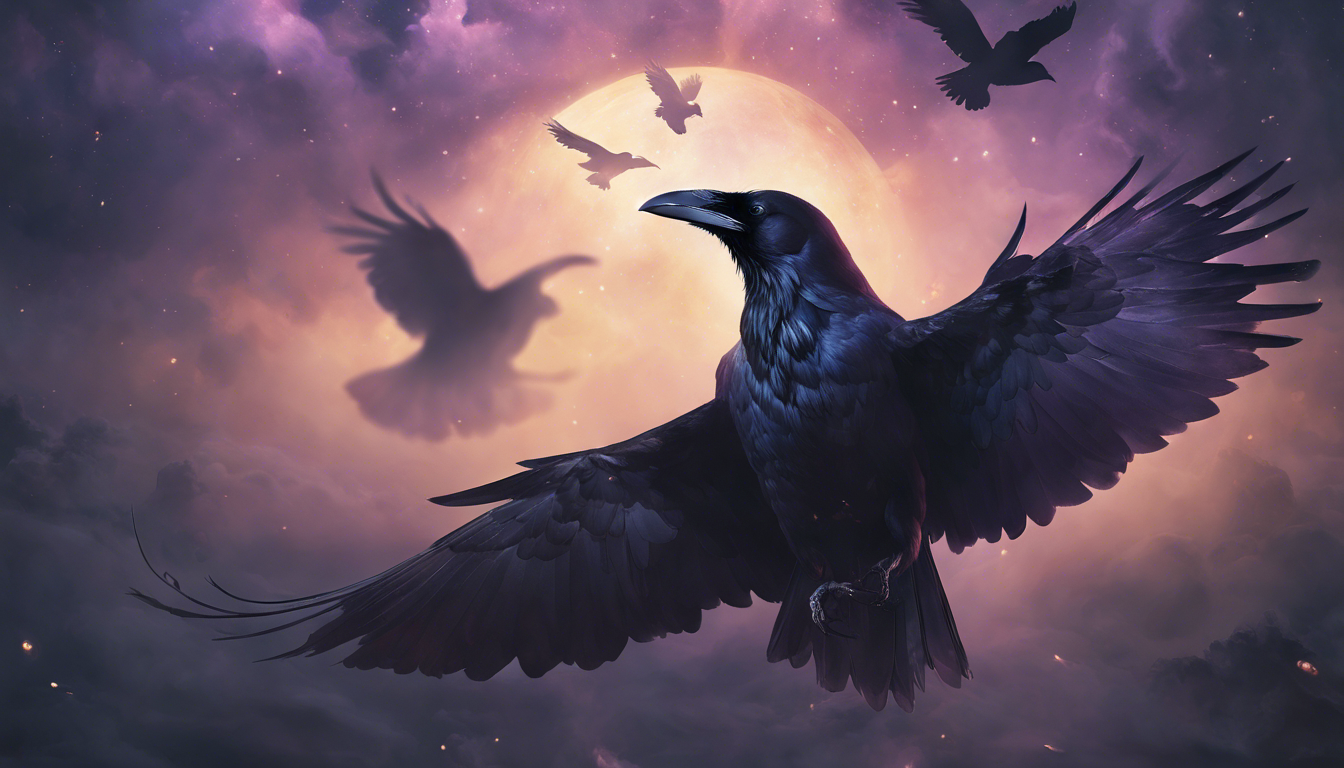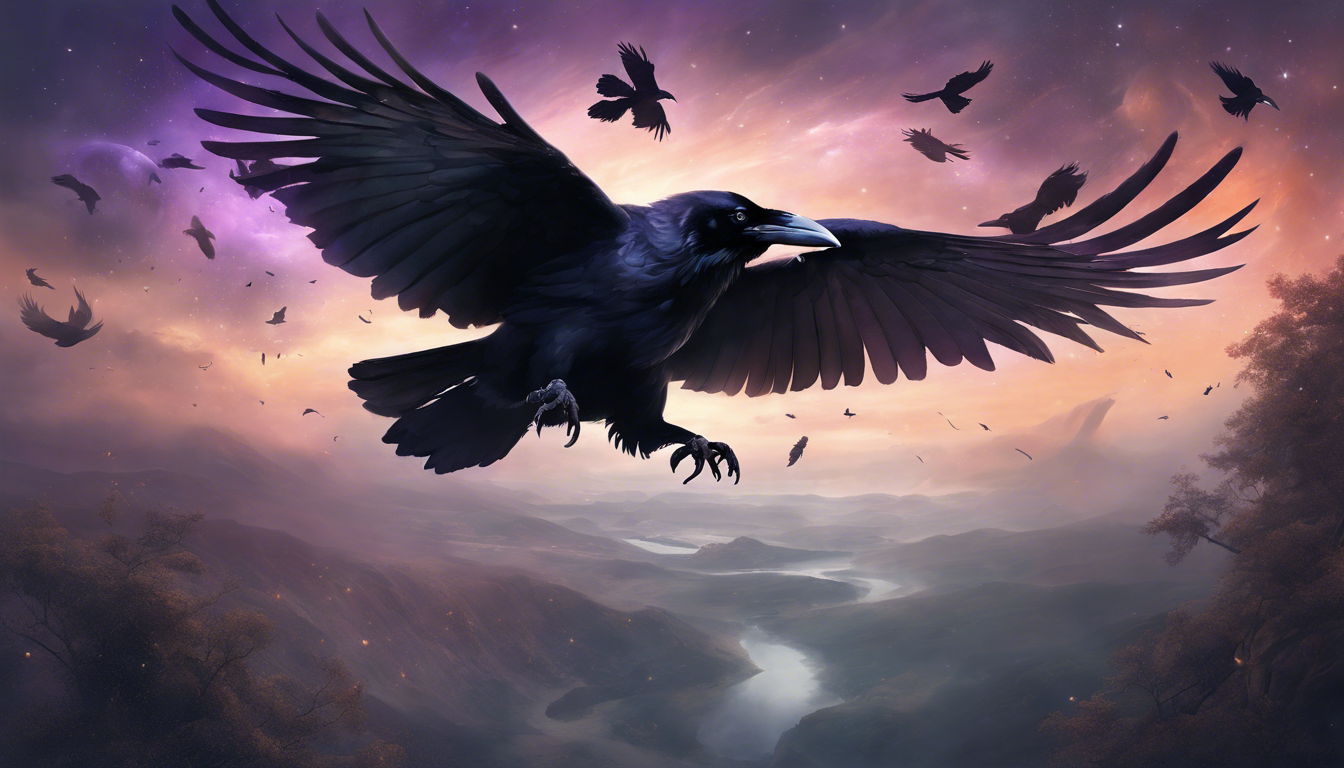The Historical Significance of Ravens
Ravens hold a prominent place in human history and mythology, being one of the most intriguing and mysterious creatures in literature, folklore, and spirituality. These intelligent and adaptable birds have captured the imagination of people for centuries, symbolizing a wide range of meanings and embodying both positive and negative connotations. From ancient legends to modern literature, the historical significance of ravens is deeply rooted in various cultures around the world.
Ravens in Mythology and Religion
Ravens have been revered in many mythologies and religions throughout history. In Norse mythology, the god Odin had two ravens, Huginn (Thought) and Muninn (Memory), who would fly across the world and gather information for him. In Native American cultures, ravens are regarded as powerful spiritual beings, often associated with wisdom, magic, and transformation. They are believed to be messengers between the human and spirit world.
Ravens also play a significant role in religious texts. In the Bible, the raven is mentioned several times as a symbol of God’s provision. In the story of Noah’s Ark, the raven was sent out to find dry land after the great flood. In Celtic mythology, the raven is associated with the goddess Morrigan, who was believed to shape-shift into a raven during battles.
Ravens in Literature and Art
Throughout literature, ravens have been portrayed as mysterious and enigmatic creatures. Edgar Allan Poe’s famous poem, “The Raven,” depicts a bird that haunts the narrator with its repeated refrain of “nevermore,” symbolizing a haunting and eternal despair. Ravens also make appearances in the works of William Shakespeare, where they are often associated with death and the supernatural.
Ravens have also been featured in various forms of art, from paintings to sculptures. The iconic raven sculpture at the Tower of London, for example, is a symbol of the city’s rich history and tradition. These dark and intelligent birds continue to capture the imagination of artists and inspire their creations.
The Symbolism of Ravens
Ravens are often associated with mystical and symbolic meanings. They represent wisdom, intelligence, and foresight. Their black feathers are seen as a symbol of darkness and mystery, but also of protection and guidance. Ravens are often seen as guardians and messengers, bringing important messages from beyond. They are believed to possess a deep connection to the spiritual world and serve as a bridge between the material and the divine.
In conclusion, the historical significance of ravens is rich and diverse, spanning across different cultures, mythologies, and religious beliefs. These magnificent birds have fascinated humans for centuries, symbolizing various aspects of life, spirituality, and the human experience. Whether as messengers of gods or harbingers of doom, ravens continue to inspire and captivate our imagination, reminding us of the mystical and magical forces that surround us.
Ravens in Mythology and Folklore

Ravens have long held a special place in mythology and folklore all around the world. These intelligent and mysterious birds have been associated with various symbols, gods, and even death. Let’s explore the fascinating world of ravens in mythology and folklore.
1. Norse Mythology: Odin’s Ravens
According to Norse mythology, Odin, the king of the gods, had two ravens named Huginn and Muninn, which meant “thought” and “memory” respectively. These ravens would fly across the world each day and bring back information to Odin about what was happening in the human realm. They were seen as his trusted messengers and symbols of his wisdom.
2. Native American Folklore: Trickster and Creator
In Native American folklore, the raven is often portrayed as a trickster figure and a creator. Many tribes believe that the raven played a vital role in shaping the world as we know it. In some stories, the raven steals the sun, moon, and stars to bring light to a dark world. In others, the raven teaches humans valuable lessons through its mischievous deeds.
3. Celtic Mythology: The Morrigan
In Celtic mythology, the raven is associated with the goddess known as the Morrigan. She was a powerful and complex figure, often associated with war, fate, and transformation. The raven, as one of her forms, is seen as a symbol of impending death and battle. It is also believed that the raven served as a guide for souls in the afterlife.
4. Ancient Greek Mythology: Apollo’s Messenger
In ancient Greek mythology, the raven was considered a bird of prophecy and a messenger of the god Apollo. It is said that Apollo turned a white raven black after the bird brought him bad news. From then on, black ravens were seen as symbols of ill fate and were associated with foreboding messages.
5. East Asian Folklore: The Three-Legged Crow
In East Asian folklore, the raven takes on a different form known as the three-legged crow. These mystical creatures are often depicted as guardians of the sun and moon. They are also seen as symbols of wisdom and good fortune. In some stories, the three-legged crow is believed to possess magical powers and is associated with the heavens.
Ravens have captivated human imagination for centuries, and their presence in mythology and folklore continues to intrigue us. Whether as messengers, tricksters, or symbols of wisdom and death, these birds have left an indelible mark on our collective consciousness. So the next time you spot a raven perched on a branch, take a moment to appreciate the rich history and symbolism that surrounds these mystical creatures.
Ravens as Portents and Omens

Ravens as Messengers from the Spirit World
Ravens, with their sleek black feathers and intelligent gaze, have long been regarded as mystical creatures associated with the spiritual realm. In many cultures and mythologies, these birds are seen as messengers, bringing important information from the spirit world. They are believed to possess a deep connection to the supernatural and have the ability to communicate with unseen realms.
The Symbolism of Ravens
Ravens carry a rich symbolism that varies across different cultures and traditions. In Norse mythology, they are associated with the god Odin, the Allfather of the Norse deities. Odin was often depicted with two ravens, Huginn and Muninn, perched on his shoulders, who were said to bring him news from all corners of the world.
In Native American cultures, ravens are often seen as tricksters, bringers of both wisdom and chaos. They are believed to have the power to shape-shift, moving between the physical and spirit worlds effortlessly. Ravens are symbols of transformation and are often associated with messages of change and rebirth.
In Celtic lore, ravens are associated with the Morrigan, the goddess of war and fate. They are said to be her messengers, announcing imminent battles and foretelling significant events. The presence of a raven is often seen as a sign of impending change or upheaval.
Raven Omens and Their Interpretations
Ravens are known for their uncanny ability to appear at key moments in our lives, bringing with them powerful omens and messages. Here are some common raven omens and their interpretations:
| Raven Omen | Interpretation |
| A solitary raven perched on a tree near your home | An upcoming change or transformation in your life |
| A pair of ravens flying overhead | A message of balance and harmony |
| A raven cawing loudly at your window | A warning of impending danger or conflict |
| A raven appearing in your dreams | An invitation to explore your subconscious and seek spiritual insights |
Working with Raven Energy
If you feel a strong connection to ravens and want to work with their energy, here are some practices you can incorporate into your spiritual journey:
- Keep a raven feather on your altar as a symbol of spiritual guidance and protection
- Meditate on the image of a raven to deepen your connection with their wisdom and insight
- Pay attention to the messages and signs that ravens bring into your life, and journal about their significance
- Explore ancient myths and legends associated with ravens to deepen your understanding of their symbolism and spiritual significance
- Consider working with divination tools such as tarot cards or runes that feature raven imagery
Remember, the interpretation of raven omens and messages is deeply personal. Trust your intuition and allow the wisdom of these mystical beings to guide you on your spiritual path.
The Symbolic Meanings of Ravens in Different Cultures

Ravens, with their black feathers and mysterious demeanor, have fascinated people for centuries. These intelligent birds have been associated with various symbolic meanings in different cultures around the world. In this article, we will explore the symbolic significance of ravens in different cultures and delve into the rich history behind these captivating creatures.
Ravens in Norse Mythology
In Norse mythology, ravens are closely associated with Odin, the god of wisdom, war, and death. Odin had two ravens named Huginn (thought) and Muninn (memory) who served as his eyes and ears. These ravens would fly across the world, collecting information and bringing it back to Odin. Therefore, ravens were seen as the messengers of Odin, symbolizing knowledge and wisdom.
Ravens in Native American Culture
In many Native American tribes, ravens hold a prominent place in folklore and spiritual beliefs. The raven is often considered a shape-shifter and a trickster, with the ability to transform into any animal or even a human. They are believed to possess magical powers and are associated with creation, transformation, and knowledge. The Haida tribe of the Pacific Northwest even has a myth where Raven is responsible for bringing light into the world.
Ravens in Celtic Mythology
Celtic mythology also holds ravens in high regard. They are associated with the goddess Morrigan, who is the goddess of war and death. Ravens are often seen as her messengers and are believed to bring omens. In Celtic culture, seeing a raven was considered a sign that something significant was about to happen. Ravens are also linked to Bran, a heroic figure in Welsh mythology, who possessed the ability to transform into a raven.
Ravens in Egyptian Mythology
In Egyptian mythology, the raven is connected to the god Horus, who was the god of the sky and war. It was believed that Horus had the ability to shape-shift into a raven, and that the bird represented the cycle of life and death. This association with death led to the belief that ravens were the guardians of the underworld.
Ravens in Contemporary Culture
Even in modern times, ravens continue to capture our imaginations and have gained significant symbolism. They are often depicted as mysterious and enigmatic creatures in literature, films, and art. The book “The Raven” by Edgar Allan Poe is a classic example of the raven’s symbolic meaning, representing darkness, grief, and the unknown. Ravens are also commonly associated with Halloween and are seen as a symbol of mysticism and magic.
The symbolic meanings of ravens in different cultures vary, but they are consistently regarded as powerful and spiritual creatures. Whether as messengers, shape-shifters, or bringers of omens, ravens continue to intrigue and inspire us. Their deep associations with wisdom, transformation, and the mystical make them a fascinating and enduring symbol in human culture. So the next time you catch a glimpse of a raven, take a moment to appreciate the rich symbolism behind these magnificent birds.


Article written by Dera
Greetings, I am Dera, a 35-year-old individual with a deep passion for spirituality. Through my website, I aim to share my insights and knowledge to help others on their spiritual journey. Join me on the path to inner peace and enlightenment.